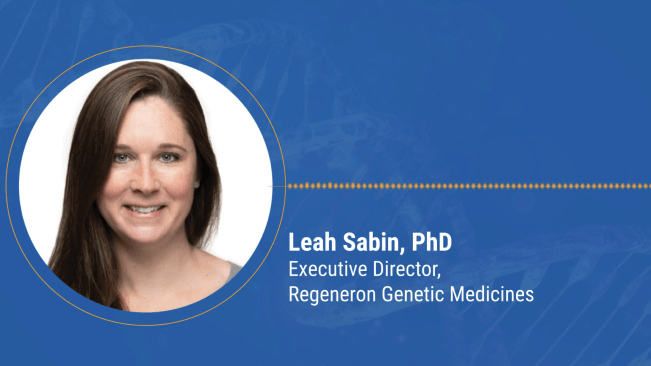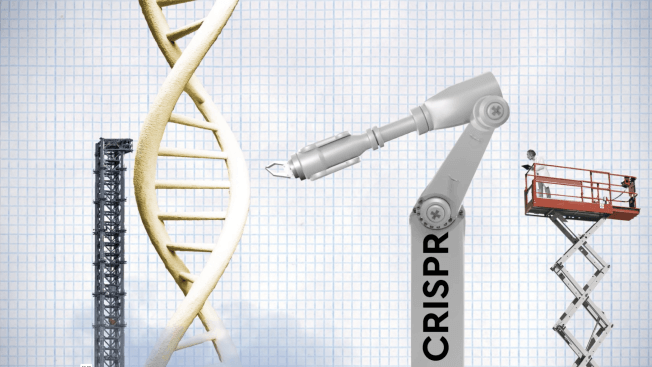The Future of Medicine is Now
Unlocking the potential of genetic medicines

We drive the innovation and the discovery of life-changing medicines by being open to multiple approaches, combining existing technologies and finding connection points in new and exciting places. Genetic medicines aim to modify genomes, enabling the expression, silencing or editing of genes. These techniques offer promising solutions for addressing various diseases and medical conditions.
In pursuing genetic medicines research, we’re always making connections. Leveraging a versatile approach, we utilize and combine existing technologies in new and exciting ways, which means we don’t just stop at the use of antibodies. Because now, we’re creating antibody-retargeted adeno-associated viruses (AAVs) to deliver any gene such as for editing or silencing, expanding Regeneron’s tool kit of therapeutic modalities.
With multiple genetic medicines-based technologies at our fingertips, we now have the potential to address the most promising genetic targets, driving forward scientific progress to change lives.
Our commitment to exploring multiple strategies leverages our antibody, biology, genetics and technology development expertise, all under one roof, to bring new medicines to people in need. Additionally, we have the capability to utilize the Regeneron Genetics Center® (RGC™) for target identification, ensuring innovative and targeted treatments for improved patient outcomes.

Genetic technologies at work
Genetic medicines allow Regeneron to pursue important targets and programs beyond what we can with antibodies alone. We are advancing best-in-class genetic medicine technologies by applying our existing industry-leading technology platforms, like VelociSuite®. We are also continuing to build in-house expertise and leverage industry collaborations, all to pursue therapeutic targets with the best-suited modalities.

Next generation delivery and payloads
Regeneron’s distinctive approach to tackling difficult-to-treat diseases centers around combinations of novel payloads, viral vectors and antibodies to enhance target specificity and reduce doses for improved safety and efficacy.
By synergistically combining these technologies with VelociGene®, our landmark mouse model platform, we can test and validate antibody targeting of genetic medicines to achieve precise delivery to target tissues — offering a versatile, highly effective approach to treating diverse diseases.
Gene editing
We utilize gene editing to disrupt genes and rethink conventional gene replacement therapy. We’re developing a targeted gene insertion platform combining gene delivery using adeno-associated viruses (AAVs) with CRISPR technologies to enhance the durability of genetic medicines for the treatment of several disorders where early intervention may be key, like hemophilia B and Pompe disease.
Our external collaborations facilitate the exchange of knowledge and innovative treatment approaches, while our genetics expertise and genomics foundation serve as the backbone of these partnerships. Regeneron, along with Intellia, were the first to successfully use CRISPR for transthyretin amyloidosis in a single dose in a clinical trial. These successes open up the possibility for providing potential lifelong treatments for serious diseases.


Gene silencing
Regeneron is at the forefront of siRNA drug discovery and development. With access to a vast database of exome sequencing data and genetic target insights collected by our Regeneron Genetics Center (RGC), along with state-of-the-art humanized mouse models, complemented by our commitment to collaboration with RNAi leader Alnylam, we are equipped with the tools to advance multiple siRNA programs, many of which are currently in preclinical and clinical testing.
Using a multipronged approach to deliver oligonucleotide therapies across tissues and cell types, we’re tapping into our understanding of antibody delivery to transport genetic medicines to difficult-to-reach tissues and organs, including the central nervous system.
Disease areas in focus
With our deep understanding of human biology and genetics, our rigorous, science-led approach to discovery is poised to inform the next wave of medicines, life-changing medicines, for the most difficult-to-treat diseases. By uniquely understanding the breadth and depth of genetic abnormalities through RGC insights, we are able to translate near-term results into long-term gains, increasing accuracy in the way we select accessible targets for genetic medicines.
Neurological diseases
In the pursuit of breakthroughs in neurological diseases, genetic medicines play a vital role in transforming the landscape of treatment options. Regeneron is pioneering the application of siRNA technology in addressing life-altering diseases like Alzheimer's disease, Huntington’s disease, amyotrophic lateral sclerosis and pain, paving the way for innovative and potentially transformative therapies for patients and their families.
Cardiometabolic disorders
Cardiometabolic disorders comprise a broad spectrum of diseases like heart failure and liver diseases, and represent a significant healthcare challenge. Genetic medicines represent a promising solution to address this diverse array of conditions. Regeneron is already making strides in the field of obesity by investigating gene silencing technology, reflecting our commitment to pioneering innovative therapies in the field.
Lysosomal storage disorders
Regeneron’s precision antibody-targeting technology has paved the way for a novel method of delivering replacement enzymes. Our successful invention of an array of antibodies specifically designed to target enzyme replacement therapies to their intended target tissue provides a promising treatment approach for lysosomal storage disorders. This approach may offer new possibilities for more effective therapies in the field of genetic medicines.
Hearing loss
By focusing on places where local delivery is an option, like the inner ear, we can easily assess novel therapies without the complications of systemic delivery. Having a well-defined genetic lesion instills greater confidence in inner ear drug delivery, making it a crucial preliminary step before addressing more complex hearing loss disorders.
Regeneron’s pioneering AAV technology and knowledge of the inner ear is enabling rapid advancement of therapeutic candidates. By identifying patients with specific genetic mutations related to hearing loss and utilizing cutting-edge mouse models, we can gain deeper insights into the intricate biology of hearing disorders and bring life-changing medicine to the clinic.
Discover how Regeneron is implementing auditory gene therapies to advance the treatment of hearing disorders.
Eye diseases
Regeneron aims to restore vision by targeting age-related macular degeneration, diabetic retinopathy and glaucoma, leveraging our existing technology to ensure safety and efficacy through genetics-based approaches.
Our goal is to create interventions using siRNA technologies that allow for reduced dosing frequency, thereby minimizing the need for repeated administration. Furthermore, we aspire to extend this technology to cure individuals with current blindness, employing breakthrough techniques, such as optogenetics.
Musculoskeletal disorders
With approximately 1.7 billion people worldwide affected by musculoskeletal disorders and significant unmet needs persisting, gene therapy stands out as a crucial solution, particularly for inherited diseases like myasthenia gravis. Regeneron is uniquely positioned to take on this challenge and revolutionize the treatment landscape for musculoskeletal disorders by tapping into our understanding of antibody targeting to transport genetic medicines beyond the liver and redirect viral particles to skeletal muscle to deliver therapy.






